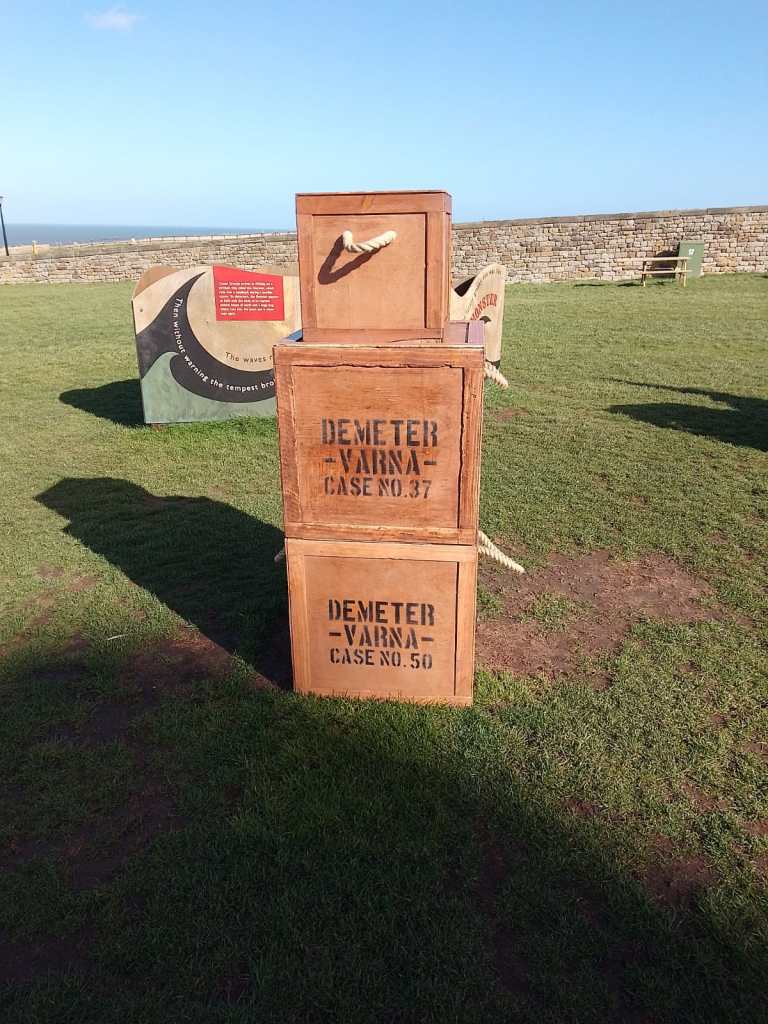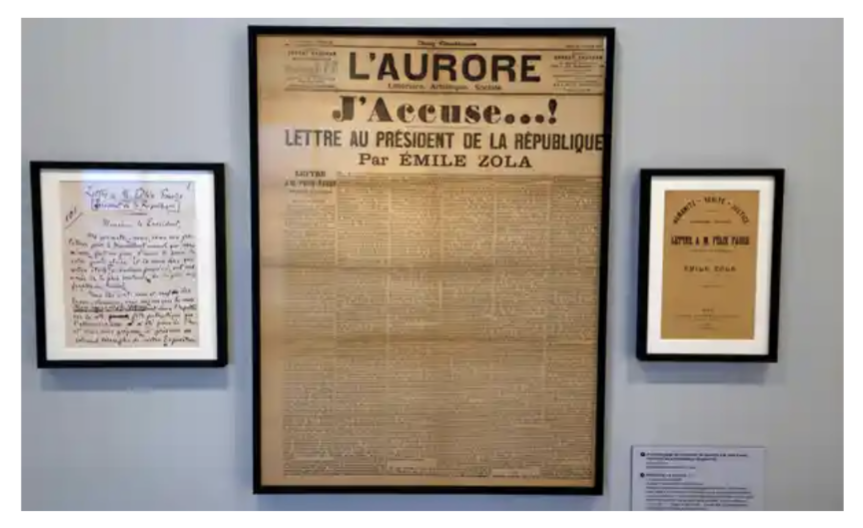A few words on nostalgia
Posted by The Assommoir in Book on January 27, 2024
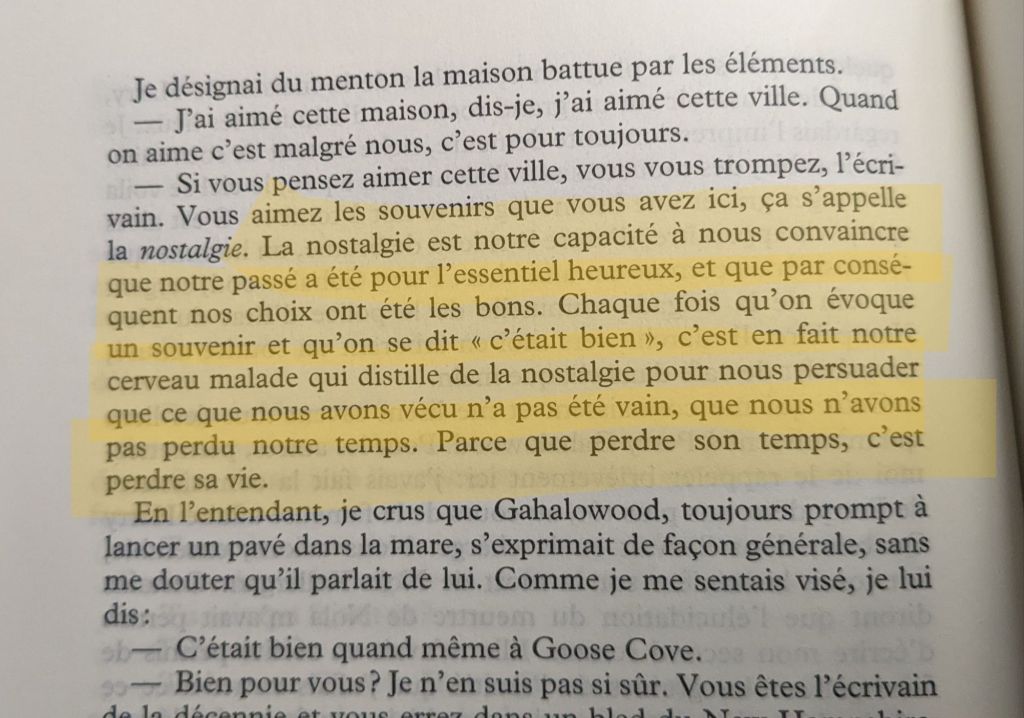
“Nostalgia is our capacity to convince ourselves that our past has essentially been happy, and that therefore our choices have been good. Each time we recall a memory and say ‘it was good’, it is in fact our sick brain distilling nostalgia to persuade us that what we’ve lived through hasn’t been in vain, that we haven’t wasted our time. Because wasting your time is wasting your life.”
(translated – with apologies – from L’Affaire Alaska Sanders by Joël Dicker)
Things I’d forgotten about The Exorcist
Posted by The Assommoir in Film on October 13, 2023
It being Friday the 13th and me having some time on my hands obviously I decided to watch The Exorcist for the second time. The first being about 25 years ago, and the most frightening film experience of my life (The Blair Witch Project a close second).
Time and popular cultural references being what they are, my memories of the film were limited: a scary bit early on where Chris is in the attic and I expected a huge jump scare but only a tiny one came, and, obviously all of the famous demonic possession bits. And a deleted scene where Regan walks down the stairs like a spider.
Now, there are one or two properly considered and well-written pieces about this film knocking around, if you look very hard on the internet. This, by contrast, is a collection of Things I’d Forgotten About The Exorcist.
1. Father Merrin gadding about in the desert at the start. He finds a medallion. He gets shaky and takes some medicine. He faces off with a weird and creepy statue.
2. The film within the film. “The Walt Disney version of the Ho Chi Minh story”.
3. Chris MacNeil’s status. That house, those servants, that invitation (casually received) to an intimate evening meal at The White House. Demonic possession, it seems, knows no social boundaries.
4. (speaking of Chris’s servants) The butler who’s accused of being a Nazi and doesn’t actually deny it.
5. Father Karras’s status. Not quite as exalted as Chris’s. His mum would have benefited from one of those servants popping in once a week, for example.
6. The ouija board, and Captain Howdy. Nearly as creepy as Pazuzu, mainly due to the name.
7. The medical procedures Regan is put through. I hope to Christ I never need to have a cerebral angiography.
8. Burke’s death.
9. The police investigation into Burke’s death.
10. How late on the actual exorcism starts. There are only 40 minutes left when Father Karras first meets Regan, and barely 20 left when he and Father Merrin get going.
11. Regan/Pazuzu’s variety of voices. Very disturbing. But also a very unexpected laugh-out-loud moment with “la plume de ma tante”.
12. The sheer horror of the body horror.
13. The really quite stark gender differences. Female: emotionally overwrought, mentally unstable, and/or demonically possessed. Male: power and solutions (sort of).
I got all earnest at the end there. But part way through the list I realised I had to have 13, obviously.
Sweet dreams.
Important news
Posted by The Assommoir in Book, Film on September 3, 2023
I’ve just ordered this from Amazon after (literally) years of it being on my wishlist but never in stock.
This is genuinely a big deal.

Engrenages (Spiral) S01 E03
Posted by The Assommoir in TV on June 16, 2023
Episode 3 begins right where we left off: Pierre, the diary, the judge, his office (note to self, I must work on this ‘Engrenages x Cluedo’ boardgame concept). Roban is immediately angry; very angry. But he checks himself and apologises to Pierre, blaming his suspicion on his lack of a life outside work. Remarkably, Pierre has got away with the intrusion. Not the diary, however, as Roban picks that up to take home with him. Laure spots Pierre leaving the courts building and discretely follows him to his meeting at a café with Benoit. Pierre and Benoit despair of ever getting hold of the diary and resolving the latter’s delicate situation, right up to the point at which Pierre mentions that Roban has taken the diary home. Benoit quickly concludes that there’s nothing be that can be done, and resolves to get on with the rest of his life regardless (or similar). He makes his excuses and leaves, subsequently meeting a shady-looking bloke outside a bar – where they are watched by Laure, whose filoche* has continued.
Her surveillance comes to an abrupt halt when she runs over a pedestrian walking across a clearly marked crossing – very true to French life, that. We’ll see more of this unfortunate character through the episode, but for now this means that Benoit’s mysterious friend is able to remain unseen while stealing Elina’s diary through Roban’s open patio doors. The judge returns to his desk, startled to discover the diary is missing. Before checking his flat, he arms himself with a pistol. I find this very out of character with pretty much everything we see from Roban during the whole series, and therefore mildly disturbing.
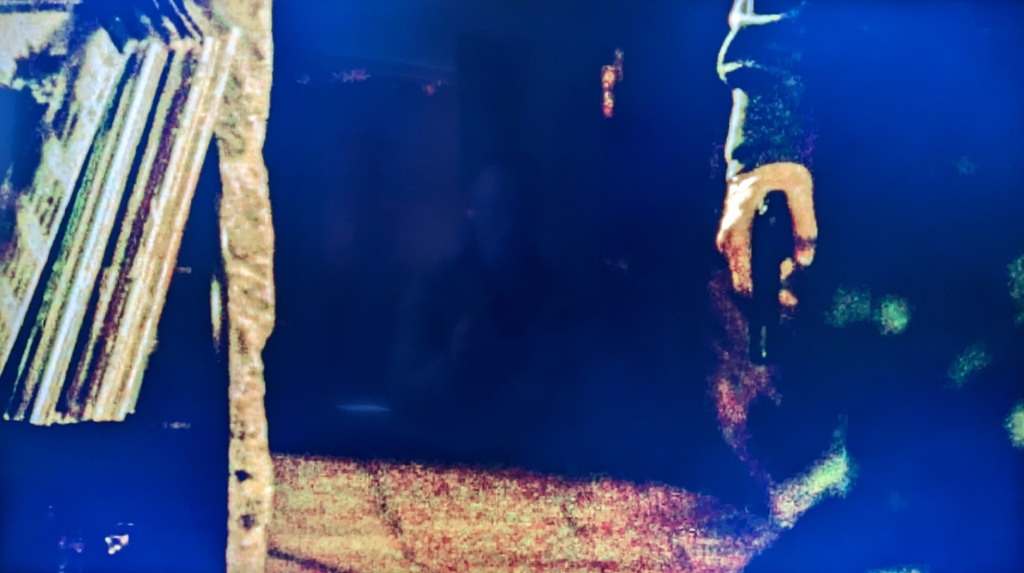
Laure tells Pierre that she followed him, and questions his relationship with Benoit. Safe to say Pierre is not best pleased about this and tries to puts Laure back in her box. We next see him acknowledging his closeness with Benoit to Roban, and vouching for his friend. While Roban says he’ll give him the benefit of the doubt over not telling him sooner, his assertion that he hopes Pierre isn’t blinded by the friendship shows he’s marked his card on this one. It’s a tense conversation and Madame Merlin, Roban’s assistant, is asked to leave.
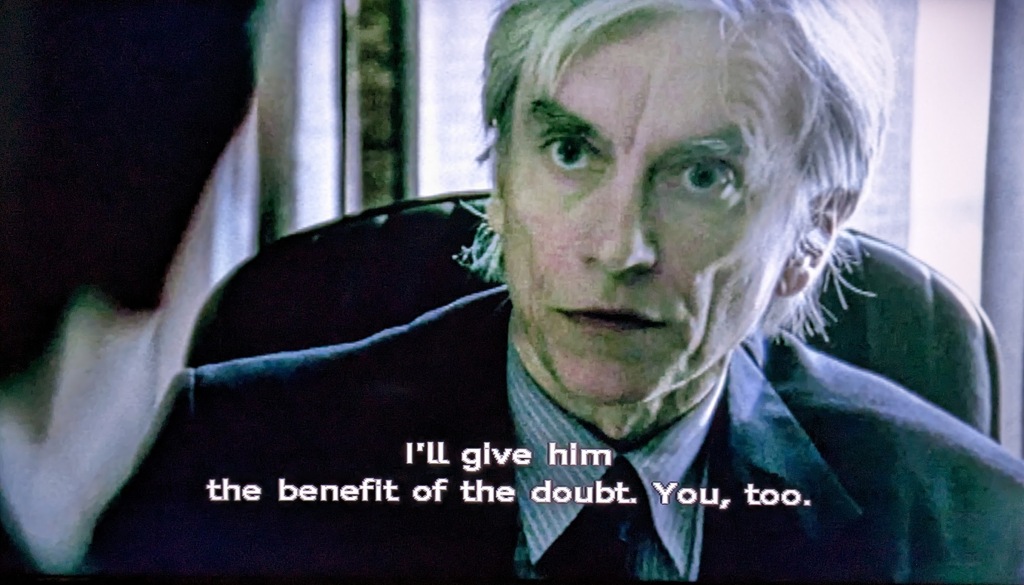
From somewhere or other, Laure rustles up a file on the shady-looking bloke outside a bar (from here on I’ll refer to him as Michel, partly because it’s quicker, and partly because it is his name) who Benoit met. He has a record for low level pimping and drug dealing, while his brother has a much more serious record for involvement in the former. Laure’s next job is to alert Roban to the relationship between Pierre and Benoit. He, of course, is one step ahead of her and instructs her to keep him informed of such things before he finds out for himself. So, a telling off from both Pierre and Roban – not a great few hours for Laure. However things take a turn for the better. This is thanks partly to Marianne (Pierre’s estranged wife) having received a very extravagant present from a new partner, which, uncomfortably for Pierre, is a duplicate of one he had brought for her. Before too long, he accepts a lift home in Laure’s car and they wake up the next morning looking like a pair of cats who got the cream. With their relationship on a new footing, he shows some vulnerability and openly asks for her help in the case.
And so returning to the unfortunate bloke mown down on a pedestrian crossing by Laure earlier on… His response to the accident was to pick himself up and run away as fast as he could while swallowing a number of packets. Gilou finally joins Laure and takes the car-crash-victim-come-drug-mule into custody, where we see a cop from another department offering his own way to get the pedestrian to talk.

A more conventional approach sees an x-ray identify the bags of coke, and a frankly stomach-churning episode in the gents toilets to recover the packets. And yet strangely only 2 of the 3 capsules have turned up as evidence. When the drug squad visit again later, thankfully Gilou remembers that the missing capsule ended up in his jeans pocket. The other cops’ mistreatment of the suspect gives Gilou a chance to hide behind a smokescreen of taking the moral high ground on this abuse, but Laure is having none of it and calls him out for his addiction.

Threads start to get entangled when it turns out that Gilou ultimately owes the shady-looking blo- sorry, Michel, for his supply of coke. Michel knows the police are onto him, but has already got the drug squad to leave him alone. He generously offers to write off Gilou’s debt… in return for Gilou giving him the same special treatment. Mais naturellement…
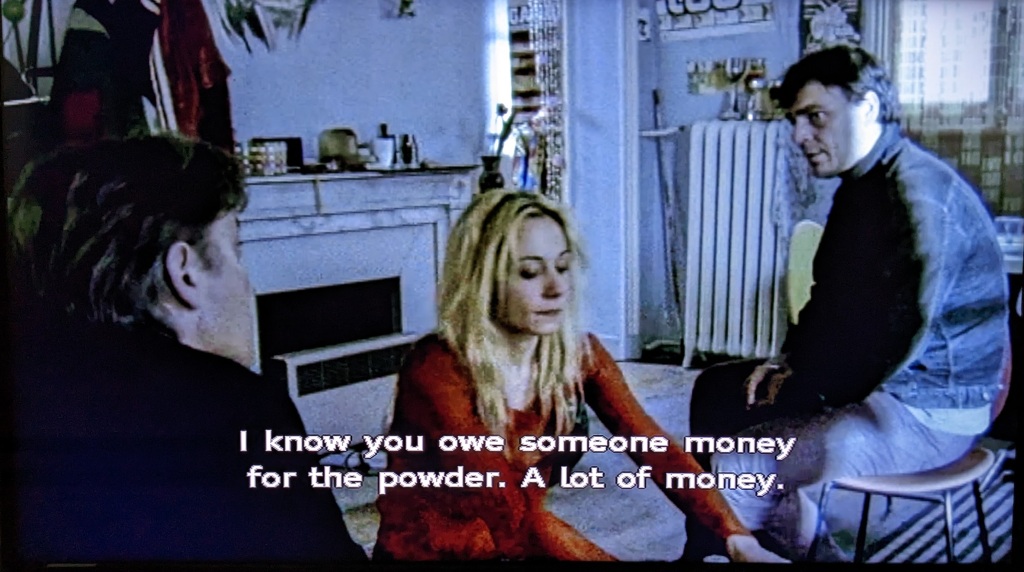
Meanwhile, another case sees the team investigating the discovery of a partly-burned body in a fireplace. Tintin’s stomach is no stronger than during his visit to the morgue, and he quickly leaves the room. The body is that of Monsieur Lessage of Porcelaine Lessage fame (such a reputed brand of crockery that it is Pierre’s in-laws preference). His wife and the kids speak to Tintin after their return from a break in Cabourg (author’s note: a lovely seaside resort, famous for its connection to Marcel Proust, regrettably less so for its wonderful mini golf course featuring an Eiffel Tower). The apparent random break-in and murder begins to break down when the post mortem (conducted by Tintin’s favourite pathologist) identifies that M.Lessage had taken part in a jeu de main (or fist f*cking ,as the subtitles rather directly translate). It turns out Mme.Lessage knew her husband was gay; it also turns out he’d not only set up a porcelain museum in his company factory, but a private room for his own use.
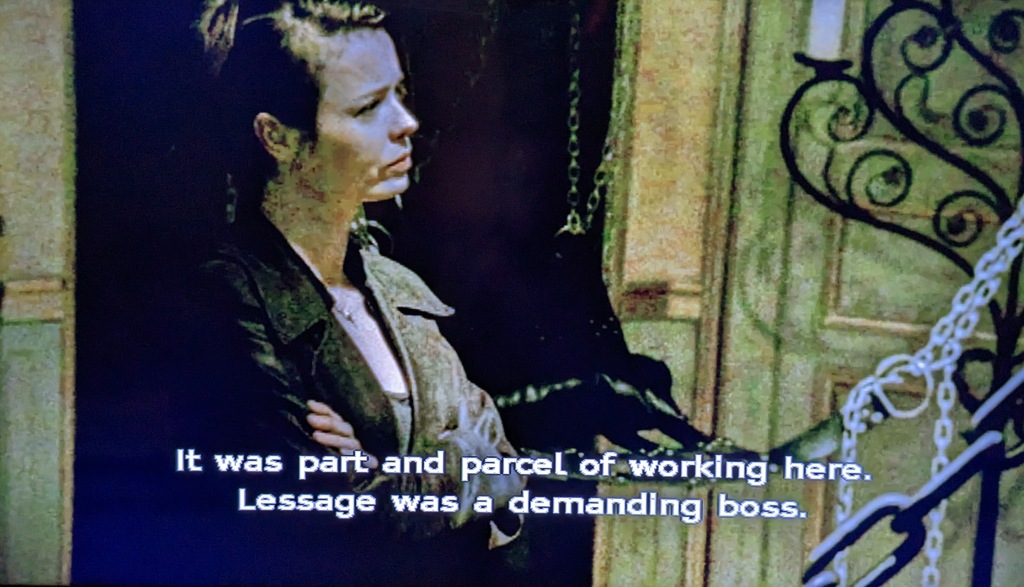
Laure and Tintin track down a certain ‘Kevin’ who they suspect of killing his lover. But analysis of Mme.Lessage’s automatic motorway payment badge data causes her story to unravel: outraged at her husband bringing Kevin back to the family home, she killed him using a golf club she’d just given him as a gift.
The case of the baby killed by the nanny progresses too, with the baby’s grandparents suggest to Roban that the mother couldn’t cope. Roban in turn speculates that with the nanny being “clearly dangerous”, the mother may have wanted rid of her baby. He manages to elicit a formal complaint from the grandparents; Mme.Merlin is not impressed at the judge**. However, there is opportunity in all things – an opportunity for Joséphine, in this instance.
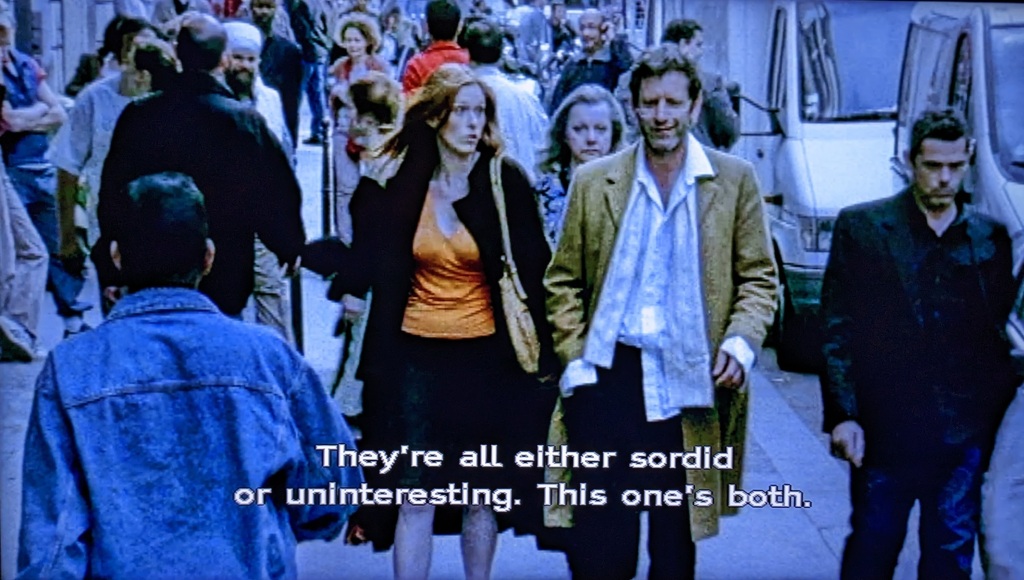
Despite her own misgivings, Leroy points out the potential for her to make a splash in defending Ghislaine Androux against the grandparents’ complaint, including getting the press on side. This could be just what Joséphine has been waiting for.
*filocher, one of my favourite Engrenages-isms
** I can’t remember when or why she is replaced as assistant by Marianne, but with the benefit of hindsight this current working relationship clearly isn’t destined for success
Nosferatu le vampire
Posted by The Assommoir in Uncategorized on March 10, 2023
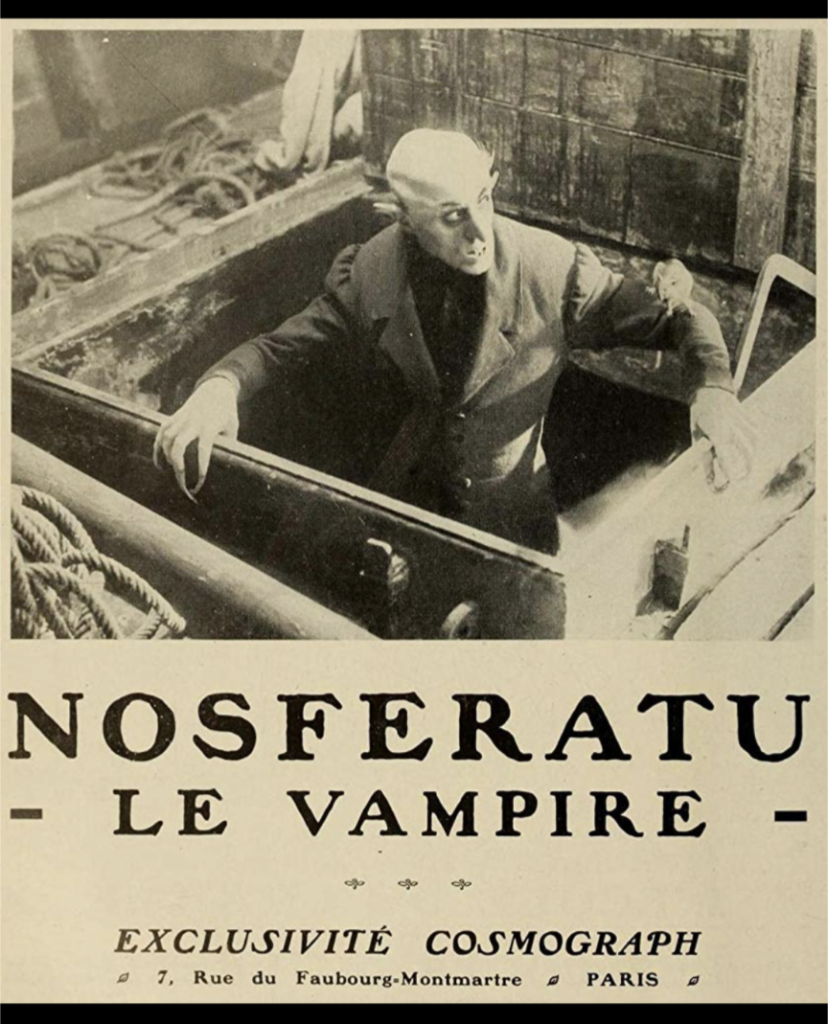
As seen on Twitter.com/HorrorHammer1
Zola alone of all Frenchmen has had the courage to stand forth
Posted by The Assommoir in Uncategorized on February 9, 2023
Engrenages (Spiral) S01 E02
Posted by The Assommoir in TV on January 30, 2023
The previous episode’s cliff-hanger results in Pierre and Benoit visiting juge Roban, and, later, Benoit and Roban in a tense one-to-one. Benoit’s knowledge of the Macguffin-esque diary is gnawing away at him, leading to him asking Pierre to ‘borrow’ it to help him out. Pierre can hear the inverted commas as he says it, appropriately enough, given he recently ‘hung a painting’ in the flat with his estranged wife Marianne.
Roban instructs Laure to investigate Benoit. In parallel, Pierre does some investigation of his own – an off-the-record probing of his father-in-law’s business dealings with Benoit. Marianne’s father clearly believes himself to be a man of the world (having left the School of Hard Knocks to graduate from the University of Life, mate) and acknowledges the grey areas between legality and what we might think of as the cost of doing business.
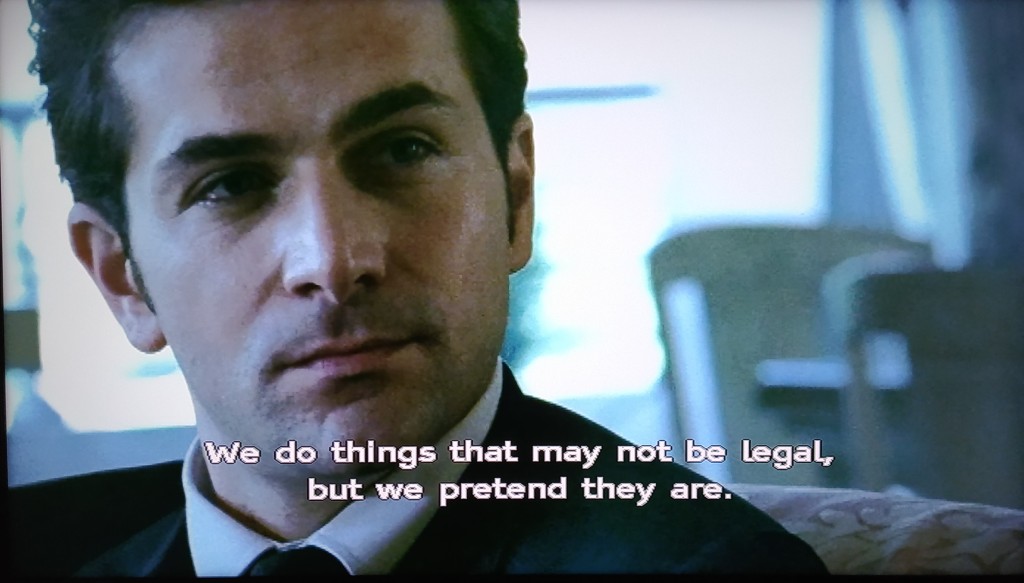
Confronting Benoit about these shady deals, Pierre has the mirror held up to him about his own compromised position (or, as Pierre himself calls it, blackmail) regarding his grace and favours apartment.
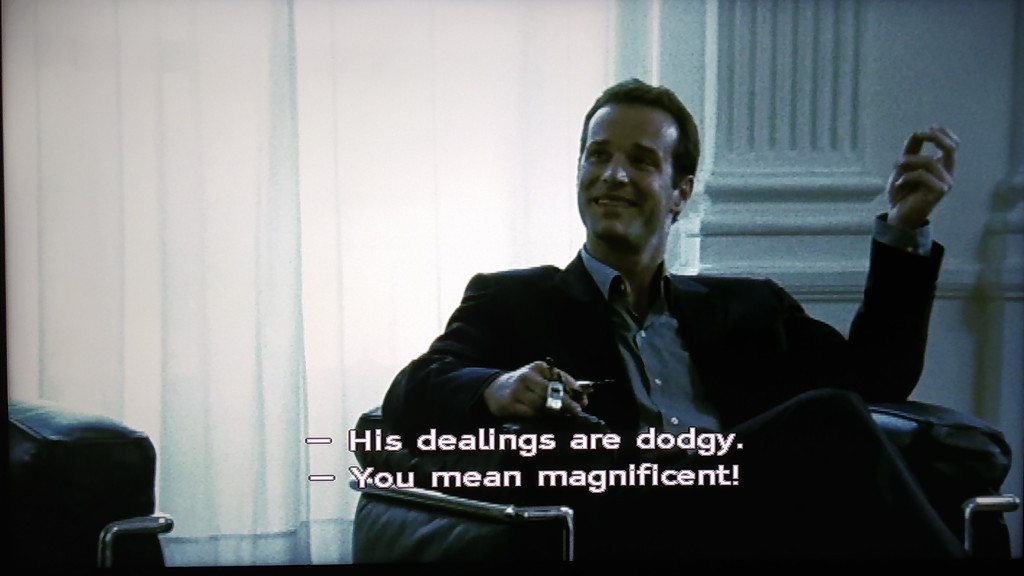
Meanwhile, Joséphine and Leroy continue to dance around the specifics of her employment. She agrees to work for him, securing a 30% increase on her rates, before pressing on to discover why he was disbarred. The revelation of his rape conviction* clearly shocks her, but she knows where her priorities lie. She is soon at work on his behalf, Leroy having engineered her presence at the morgue where Elina’s parents, against Laure’s advice, have gone to see the body. In turning the parents away from their trust in the authorities, Joséphine lays out the bleak realities of the police’s priorities around this case, and also their attempts to find Sophia.

Unsurprisingly, Laure’s attempts to dissuade Elina’s parents from seeing her were well-founded. After the viewer gets a first person view of Elina’s journey from the slab, her parents are left inconsolably distraught at the sight of her body. Later, Joséphine successfully persuades Roban, via Pierre, to link the cases. The judge agrees to see the parents.
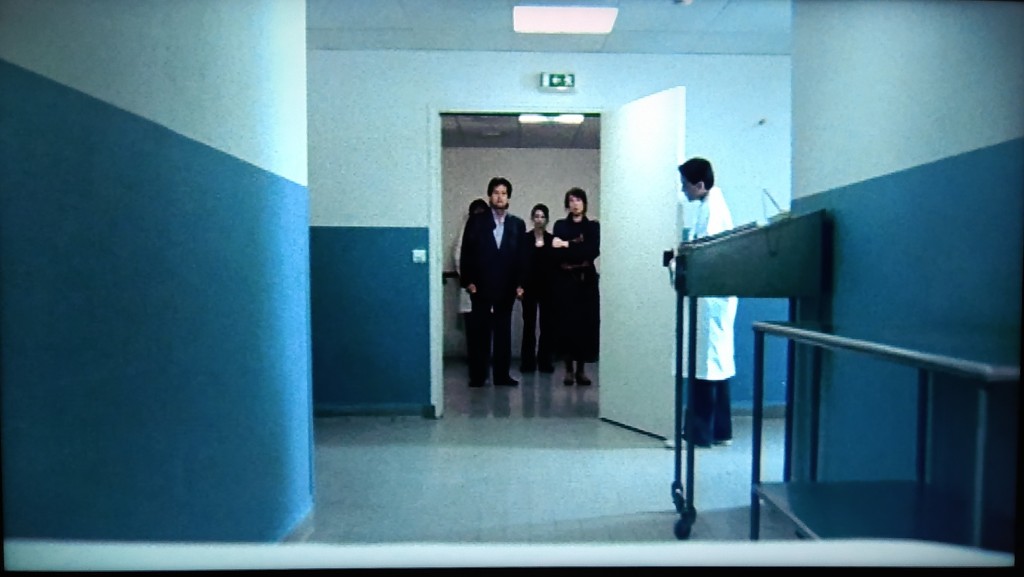
The episode concludes with Pierre agreeing to, ahem, borrow the diary. Seeing Roban leave the office for the day, he discretely enters via the curiously unlocked** door. Alas – quelle surprise! – Roban has forgotten his keys*** or some such, and returns to find catch Pierre in the act. No, he’s not hanging another painting, get out of the gutter.
There are two other cases for the team to tackle during the episode. One offering a little light relief, the other less so – namely the discovery of a blood bath in a flat, a baby’s dismembered body, and a nearly catatonic nanny. Pierre is swift to pronounce that she “probably has a history”, reinforcing the unremittingly grim view of humanity that most of the characters start off with. If this is what life in the French legal system does to you, I’ll continue to experience it vicariously if that’s alright.

The nanny’s insistence that the baby “was a burden of evil [with] evil inside it… I had to chase it out… it had to be killed” suggests that, actually, Pierre might know what he’s on about. Roban, however, is having no truck with claims of diminished responsibility: he wants accountability instead. Ultimately, Pierre is left to tell the baby’s mother that the system can’t try someone deemed to be insane. The nanny will instead be sent to a hospital. He can’t do anything more.
Time for that light relief, perhaps? A gang of young deaf people are ripping people off with their bogus charity keyrings. Light relief is a relative concept in Engrenages. But this does at least mean we get to see the gang completely unaware of the police raid on their premises despite lots of vigorous and noisy banging on doors. And we also see Laure taking a shine to the sign language interpreter. He, engaged, is wracked with guilt over their tryst. Her, less so.
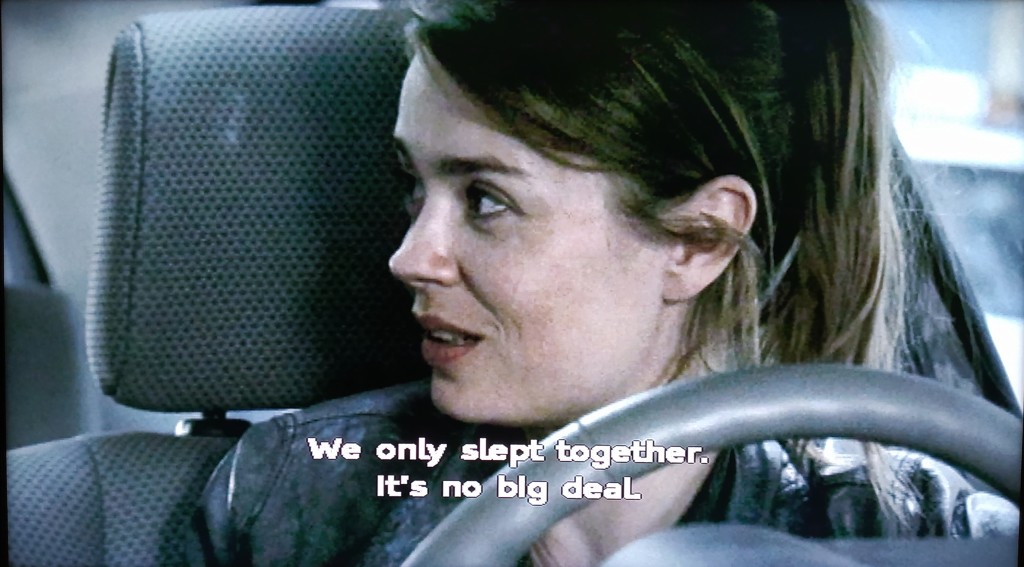
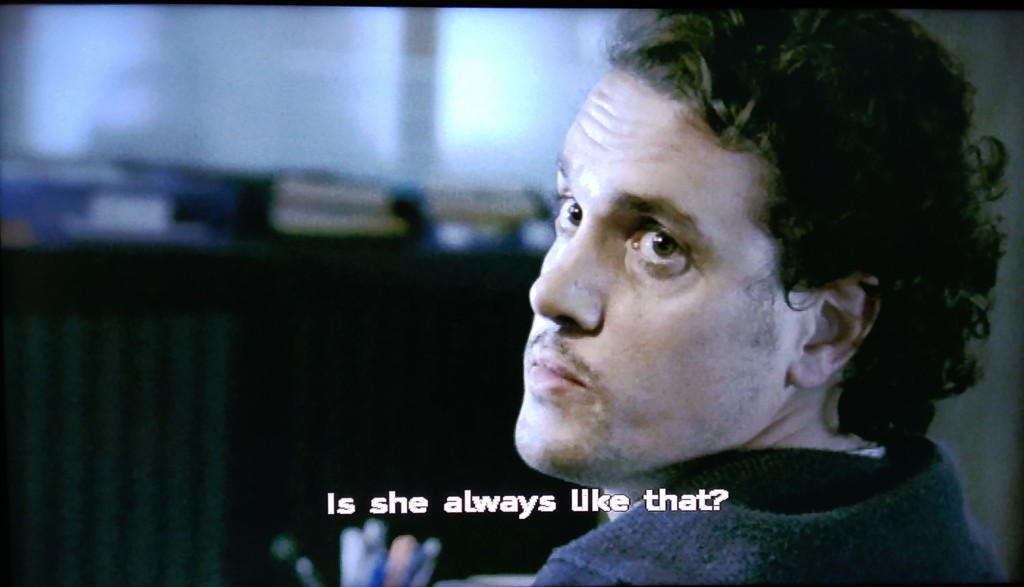
Yes mate, she is.
And at some point during all this, Gilou keeps his promise to his favourite informant/sex worker to return her bag of coke. Well, what’s left of it, anyway.
*yes, I did incorrectly mention this in Episode 1, but that’s what happens when you watch a couple of episodes back-to-back, make some cursory notes, and then return to them weeks and weeks later
**is this just forgetfulness from Roban (maybe even a VERY early seed of his future mental decline), or a request for suspension of disbelief from the creators?
*** hang on, this early-signs-of-future-decline theory DOES have legs…
Engrenages (Spiral) S01 E01
Posted by The Assommoir in TV on January 23, 2023
An underpass littered with industrial detritus. Discarded tyres, skips full of rubbish. And in one skip, a naked body. Welcome to Paris.
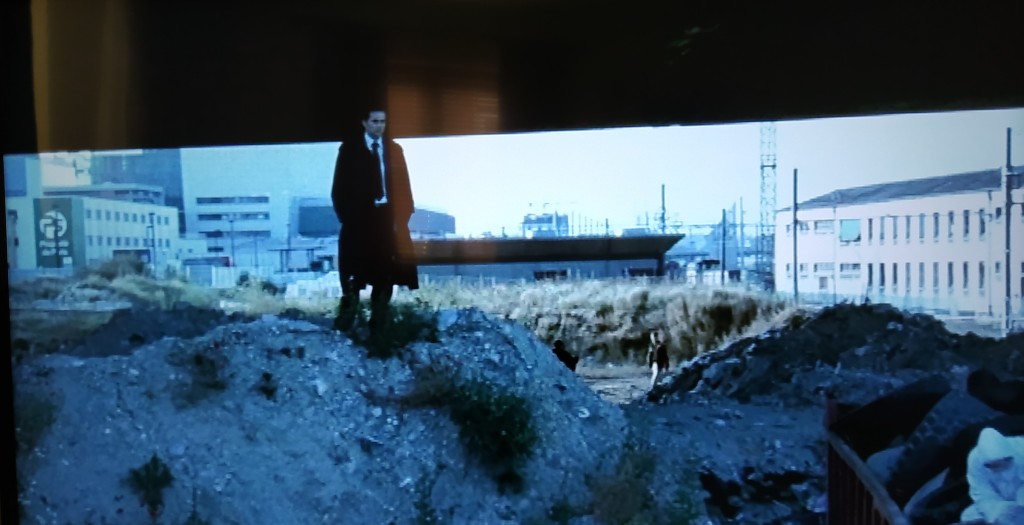
We’re quickly introduced to Pierre Clément, the new public prosecutor. And we see him stood astride a pile of rubble, overseeing operations, while Gilou* cracks on with his job at the working level. Pierre offers some observations on what’s taken place – “she was killed because she was beautiful” … “she must have been beautiful”. Laure Berthaud, capitaine de police, likes him.
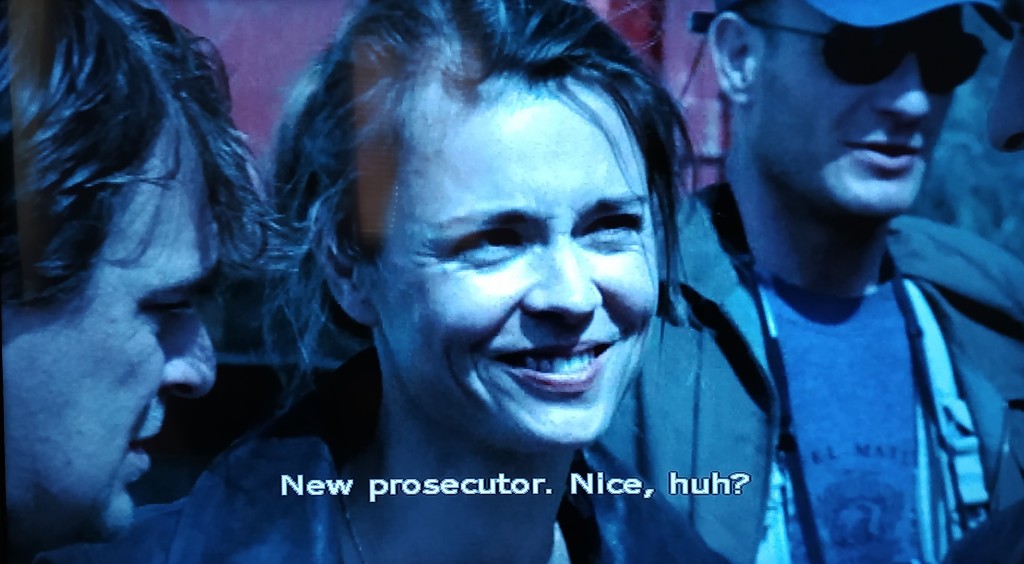
Cue the titles. A swirling, confused jumble of letters out of which emerges Engrenages.
A marvellously matter-of-fact pathologist carries out the post-mortem into our victim. He delivers a withering verdict on the surgical techniques of the Communist bloc, adding to the mechanical, factory feel of events and treatment of the victim. He sees things very much as Pierre did: “she must have been beautiful; that would explain the ferocity”. The victim’s face has been beaten beyond recognition. Tintin (lieutenant Fromentin), colleague of Gilou and Laure, faints.
We meet Roban, juge d’instruction**. He quickly makes up his mind about the victim too – a “pute de l’est”. After all, he feels, those over here often are; and she has the profile: pretty, blonde, well proportioned.
Back with Gilou, and we see him using his network in an attempt to glean some information on the victim. His sex worker contact can’t shed much light, but she does give him a bag of cocaine. He assures her (and himself) that he’ll return it next time. Meanwhile Tintin finds out about a missing girl, Sophia, reported missing by her sister Elina. Gilou and Laure visit Elina’s flat; their imminent arrival means a break-in attempt is abandoned. Gilou undertakes a stake-out from his car, until boredom strikes and he snorts a line of coke from a Derniers Messagers CD case, meaning he misses the break-in artist leaving the building. Laure discovers the flat has been broken into. “Cleaned, not burgled”. Later, Gilou tries really hard to avoid taking another line of coke in the toilets at work, for a bit at least.
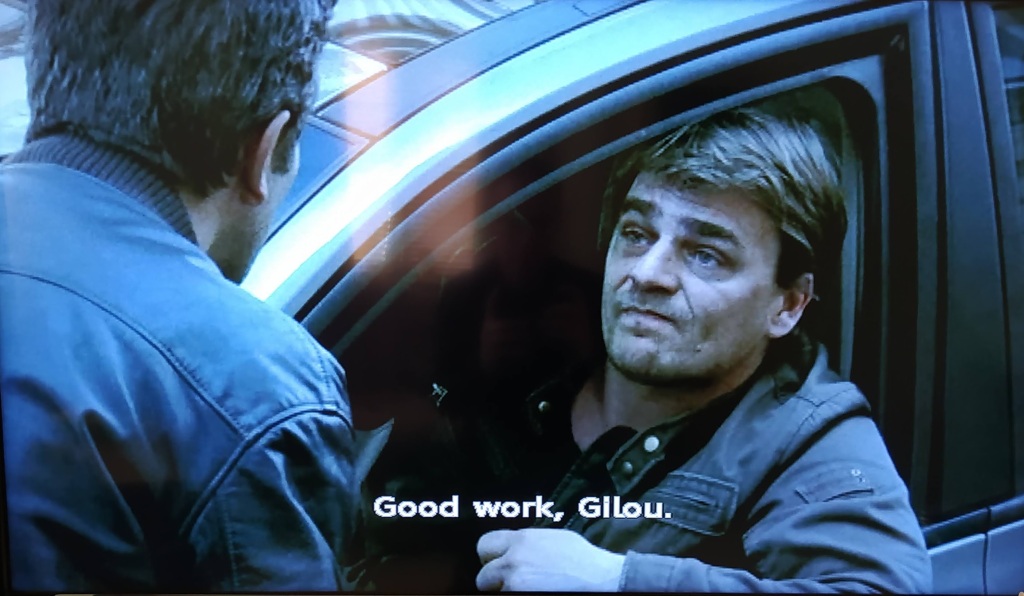

The body is identified as Elina. It turns out that Pierre’s mate Benoit (some sort of well-connected homme d’affaires who is helpfully letting Pierre, following his recent separation, stay rent-free in a very nice apartment) knew Elina. “She was beautiful”, which is good to get confirmed, after all the speculation. Elina’s diary is recovered from a taxi driver’s back seat, and is found to have several names of well known men who were clients of hers.
The episode ends with Elina’s final taxi ride being traced to Benoit’s home address. Pierre is not impressed. “Do I call the police, or smash your face in?”. Decisions, decisions.
Away from this main plotline, we meet a schoolteacher accused by parents of mistreating her pupils through use of a puppet witch (Farandole) and broomstick. The teacher says she is using Farandole only to teach ideas “outside the curriculum”. The parents are clearly furious as they’ve organised a petition to have the teacher removed. You could almost call it a witch-hunt. Although unorthodox (and clearly, to the viewer at least, suffering some form of mental health condition), there is no case to pursue against the teacher. Pierre is suitably scathing of the parents. He tells the teacher the outcome of the case and is keen for her to take action of her own. She is catatonic, and Pierre blames himself for having pushed her too far.
Meanwhile the second sub-plot introduces us to Joséphine Karlsson, a laser-focused lawyer who capitalises upon her legal partner’s untimely death on the job to put herself firmly in the spotlight. She passes off her own closing speech as his, after urging Pierre that they should press on with the case as soon as possible as any delay will “spoil my show”. Marvellous. Winning the case (inevitably), she makes a strong impression on Pierre, as well as a fellow lawyer. This latter introduces Joséphine to Leroy, a debarred lawyer who appears to be something of a mad professor.
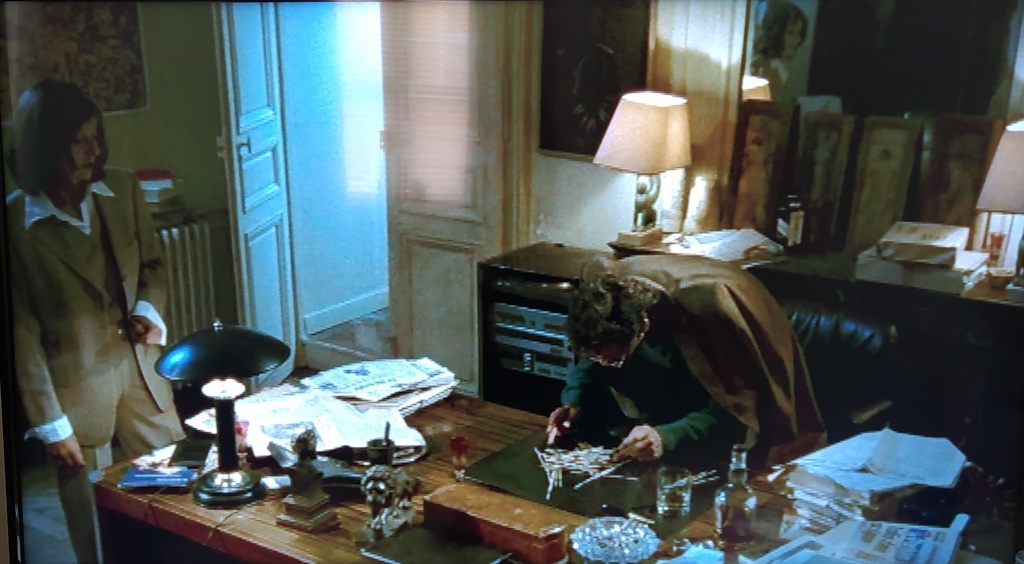
He asks Joséphine to take on cases under his guidance and instruction. He’s no longer able to after being convicted of rape – falsely, Leroy says. Visibly shocked, Joséphine soon gains enough composure to negotiate improved terms for herself.
All in all, quite the start. We seem to be in a clinical, industrial, judgemental world. Several moral and ethical boundaries have already been ripped apart, gleefully. Welcome to Engrenages.
*there will be lots to say about Gilou
** ‘investigating magistrate’
